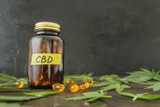How to Select the Right CBD Milligram Strength: Your 2024 Dosage Guide
CBD has surged in popularity over the past few years, finding its way into a wide array of products. Despite its ubiquity though, one of the most challenging aspects of starting a CBD regimen is determining the appropriate milligram strength. That’s right, choosing the right CBD strength is crucial to achieve desired effects while avoiding potential side effects, and luckily for you, we’ll be offering up an awesome guide for you doge with CBD properly.
An Insight into CBD and How It Works
Cannabidiol (CBD) is one of over 100 cannabinoids found in the cannabis plant. Unlike tetrahydrocannabinol (THC), the psychoactive component of cannabis, CBD does not produce a ‘high’. Instead, it’s celebrated for its potential mind & body benefits.
Now, cannabidiol interacts with the body's endocannabinoid system (ECS), which has a crucial role in regulating various physiological processes, including mood, pain sensation, appetite, and immune response. The ECS consists of CB receptors (CB1 and CB2), endogenous cannabinoids (endocannabinoids), and enzymes that synthesize and degrade these cannabinoids. CBD primarily interacts with CB2 receptors, which are more prevalent in the immune system, and influences the body's natural production of endocannabinoids.
Factors Influencing CBD Dosage
There are several key factors which influence the appropriate CBD dosage, making it a highly individualized process.
Factor #1: Body Weight
Your body weight significantly impacts how CBD affects you. Generally, individuals with higher body weight may require a higher dose to experience the same effects as those with lower body weight. A common starting point is to use a dose of 1-6mg of CBD for every 10 pounds of body weight.
Factor #2: Condition Being Treated
The severity and nature of the condition you're treating can affect the dosage. For instance, someone using CBD for mild anxiety might need a lower dose compared to someone using it for chronic pain or severe epilepsy.
Factor #3: Individual Body Chemistry
Each person's body chemistry is unique. Factors like metabolism, the presence of other medications, and genetic predispositions can influence how CBD interacts with your body. This is why two people with the same weight and condition might require different dosages.
Factor #4: Tolerance and Sensitivity Levels
Everyone's body reacts differently to CBD. Some people may be more sensitive to its effects and require lower dosages, while others may need higher amounts. It's important to start with a lower dose and gradually increase it until the desired effects are achieved.
Factor #5: Method of Consumption
The method of consumption can influence the effective dosage. CBD oil taken sublingually (under the tongue) is absorbed differently than CBD edibles, capsules, or topicals. Bioavailability, or the rate and extent to which CBD is absorbed into the bloodstream, varies between these methods.
Factor #6: Bioavailability of the Product
Speaking of bioavailability, this refers to the proportion of CBD that enters the bloodstream and has an active effect. Different CBD products have varying bioavailabilities:
- CBD Oil/Tinctures: Typically taken sublingually (under the tongue), with bioavailability ranging from 13-19%.
- CBD Edibles: Have lower bioavailability (6-15%) due to the digestive process.
- CBD Vapes: Offer higher bioavailability (34-56%) due to direct absorption through the lungs.
- Topicals: Applied to the skin and provide localized relief, with low systemic bioavailability.
Factor #7: CBD Extract Type
The form of CBD product you choose can influence the strength you need:
- Full-Spectrum CBD: Contains all cannabinoids, including trace amounts of THC, and may provide an "entourage effect" that enhances the overall benefits. Lower dosages may be needed due to this synergistic effect.
- Broad-Spectrum CBD: Contains multiple cannabinoids but no THC, offering some entourage effect without the psychoactive component.
- CBD Isolate: Pure CBD with no other cannabinoids, often requiring higher dosages to achieve the same effects.
Common CBD Dosage Guidelines
While individual needs vary, there are some general guidelines based on the form of CBD and the conditions being treated that you need to be aware of.
1. Low Strength (5-15mg per serving):
- Suitable for: Mild anxiety, general wellness, minor aches, and mild sleep issues.
- Forms: CBD oil, gummies, capsules.
- Usage: Start with a low dose and gradually increase until you find the sweet spot for your symptoms.
2. Medium Strength (15-30mg per serving)
- Suitable for: Moderate pain, inflammation, moderate anxiety, and more pronounced sleep issues.
- Forms: Tinctures, edibles, softgels, and topicals.
- Usage: Often used by individuals who have built some tolerance to CBD or require stronger relief.
3. High Strength (30-60mg per serving):
- Suitable for: Severe pain, chronic conditions, severe anxiety, and strong sleep disturbances.
- Forms: Concentrated oils, high-potency capsules, and certain edibles.
- Usage: Typically recommended for experienced users or those with specific therapeutic needs.
4. Very High Strength (60mg+ per serving)
- Suitable for: Chronic and severe conditions such as cancer pain, severe anxiety disorders, epilepsy.
- Forms: Extra-strength oils, medical-grade CBD products.
- Usage: Should be approached with caution and under the guidance of a healthcare professional.
Calculating Your Ideal CBD Dosage
Finding your ideal CBD dosage involves some trial and error. You see, CBD products come in various potencies, typically ranging from 100mg to 3000mg per bottle/bag/jar. Ensure you understand the concentration per serving and adjust your dosage accordingly.
Product Type #1: CBD Oil/Tinctures
CBD oil is commonly taken sublingually (under the tongue) for faster absorption.
General Dosage Guide:
- Beginner: 5-10mg of CBD per dose.
- Intermediate: 10-20mg of CBD per dose.
- Advanced: 20-40mg of CBD per dose.
Calculation:
- Determine the total amount of CBD in the bottle (e.g., 1000mg in a 30ml bottle).
- Divide the total CBD by the number of milliliters to get the concentration per ml (e.g., 1000mg / 30ml = 33.33mg/ml).
- Decide how many milligrams you want to take and measure accordingly (e.g., if you want 10mg, take approximately 0.3ml).
Product Type #2: CBD Capsules/Softgels
Capsules and softgels provide a consistent dosage per unit.
General Dosage Guide:
- Beginner: 10-15mg per capsule.
- Intermediate: 15-25mg per capsule.
- Advanced: 25-50mg per capsule.
Calculation:
- Check the CBD content per capsule (e.g., 25mg per capsule).
- Take the number of capsules that add up to your desired dosage (e.g., for 50 mg, take two 2 mg capsules).
Product Type #3: CBD Edibles (Gummies, Chocolates, etc.)
Edibles are convenient but take longer to take effect due to digestion.
General Dosage Guide:
- Beginner: 5-10mg per edible.
- Intermediate: 10-20mg per edible.
- Advanced: 20-40mg per edible.
Calculation:
- Check the CBD content per edible (e.g., 10 mg per gummy).
- Consume the number of edibles that add up to your desired dosage (e.g., for 20mg, take two 10mg gummies).
Product Type #4: CBD Topicals (Creams, Lotions, Balms)
Topicals are applied directly to the skin and are used for localized relief.
General Dosage Guide:
- Beginner: Apply a small amount (size of a dime).
- Intermediate: Apply a moderate amount (size of a nickel).
- Advanced: Apply a larger amount (size of a quarter or more).
Calculation:
- Determine the total amount of CBD in the product (e.g., 500mg in a 50ml jar).
- Estimate the amount applied based on the product's concentration and your needs.
Product Type #5: CBD Vapes
Vaping provides the fastest relief as CBD enters the bloodstream directly through the lungs.
General Dosage Guide:
- Beginner: 1-2mg per puff.
- Intermediate: 2-4mg per puff.
- Advanced: 4-6mg per puff.
Calculation:
- Check the total CBD content in the vape cartridge (e.g., 250mg in a 0.5ml cartridge).
- Estimate the amount of CBD per puff (e.g., 250mg / 100 puffs = 2.5mg per puff).
- Take the number of puffs that add up to your desired dosage.
General Dosage Tips:
- Start Low and Go Slow: Begin with the lowest dosage and gradually increase until you find the right amount for you. Observe how your body responds over a few days before making any adjustments.
- Consistency: Take CBD consistently at the same time each day to gauge its effects accurately.
- Adjust Accordingly: If you don’t experience the desired effects, slowly increase your dosage in small increments (e.g., 5mg) every few days. Conversely, if you experience adverse effects, reduce your dosage.
- Consistency is Key: Consistency in your CBD regimen is important. Take your CBD at the same time each day to maintain steady levels in your system, which can lead to more predictable results.
- Consider Professional Guidance: Consulting with your doctor/physician, especially one knowledgeable about CBD, is important because they can provide personalized recommendations based on your health condition and other medications you may be taking. And also, CBD could interact with certain medications, particularly those metabolized by the liver. So, if you’re on prescription medications, you want to consult with them before starting CBD to avoid potential interactions.
The Right CBD Dosage Can Go a Long Way!
Selecting the right CBD milligram strength is a personalized process that requires consideration of various factors including body weight, the condition being treated, individual body chemistry, and tolerance levels. Starting with a low dose and gradually adjusting it allows you to find the optimal amount for your needs. Plus, you should track your dosage, product type, and the effects experienced in a journal, as this too can help you identify patterns and adjust your dosage more effectively.
Recent Posts
-
Do Cannabinoid-Infused Capsules Actually Expire?
We have all been there. Rummaging through a pantry, a medicine cabinet, or a wellness drawer, our ha …Jan 02, 2026 -
What is Alpha-GPC and How Well Does It Work with CBD and CBG?
The modern world moves at an unrelenting pace, and with it, the quest for personal balance and enhan …Dec 31, 2025 -
Can You Add Delta 10 THC to Your Workout Regimen?
The pursuit of an optimized lifestyle has people exploring every tool at their disposal. We meticulo …Dec 29, 2025


